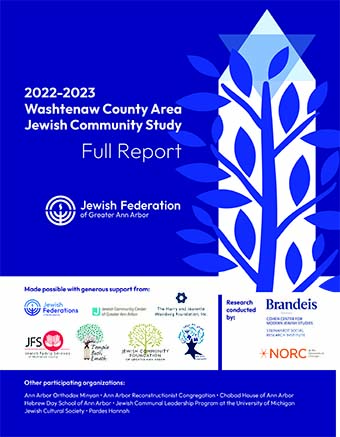2022-23 Washtenaw County Area Jewish Community Study
Janet Krasner Aronson, Matthew A. Brookner, Matthew Boxer, Leonard Saxe, Evan Herring-Nathan, David Dutwin with Adina Bankier-Karp, Alicia Chandler, Vivian Jacobs, Daniella Levine, Adam Martin, Raquel Magidin de Kramer
April 2024
The 2022-23 Washtenaw County Area Jewish Community Study provides a snapshot of today’s Jewish population in Washtenaw County and considers trends and developments in Jewish life and engagement. This study is based on an analysis of a rich set of data collected from 955 eligible households between November 2022 and January 2023. In interpreting the data, it is important to bear in mind the study represents the characteristics and views of community members at that time. During that period, the restrictions of the COVID-19 pandemic were gradually being lifted. Data were also collected well before the Israel-Hamas war that began in October 2023 and the ensuing rise in antisemitism in the United States. It is likely that attitudes about Israel, concerns over antisemitism, and other markers of Jewish identity shifted from the time of data collection to the time that this report is being written.
Key Findings:
- There are approximately 11,000 Jewish households in the Washtenaw County area Jewish community. These households include 26,300 individuals, of whom 20,000 are Jewish
- The Jewish population comprises 5% of Washtenaw County, and Jewish households make up 7% of the households of Washtenaw County.
- Compared to the US Jewish community as a whole, the Washtenaw County Jewish community has a larger share of young adults, ages 18 to 34, as well as a larger share of adults ages 50 to 64. The share who are ages 35 to 49 is smaller than among the US Jewish community.
- In the Washtenaw County area, nearly half of Jewish adults do not identify with any particular denomination. The share with no particular denomination in the Washtenaw County area Jewish community (47%) is higher than the national share of Jewish adults in this category (32%). Of Jewish adults who do identify with a denomination, the largest group identifies as Reform (32%), followed by Conservative (16%).
- Roughly half of Jewish adults are relative newcomers to the Washtenaw County area, with 15% having lived in the area for five to nine years, and 29% having moved to the area within the past four years
- Of Jewish adults in Washtenaw County, 27% plan to move away from the area in the next three years. Among the group that plans to leave, more than three quarters (77%) have lived in Washtenaw County for 10 years or less and came to the area to attend school.
- Of the 4,400 children who reside in Jewish households in the Washtenaw County area, 3,900 (89% of all children) are considered Jewish by their parents. Two thirds of these children are considered Jewish exclusively (2,900, or 66% of all children). Twenty-three percent of all children are considered Jewish and another religion. Of the remaining children living in Jewish households who are not considered Jewish, most are considered to have no religious identity (400, or 9% of all children).
- Nearly half of Jewish children (48%) are being raised by intermarried parents, while slightly less (44%) are being raised by inmarried parents. The remaining 8% of Jewish children are living with single parents.
- Ten percent of all Jewish adults in the community are full-time graduate students. Among Jewish adults ages 22-39, 29% are full-time graduate students. Forty percent of Jewish households include a current student or employee at the University of Michigan.
- Educational attainment among Washtenaw County Jewish adults is higher than among all US Jews and among Washtenaw County residents. Of Jewish adults ages 25 and older, 22% have earned a bachelor’s degree, and another 74% have earned a graduate or professional degree.
